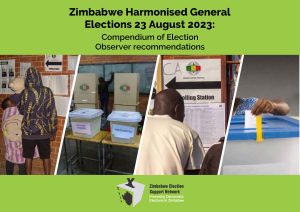Press Statement
ZESN STATEMENT ON NATIONAL BUDGET ON KEY ELECTORAL ACTIVITIES
16 DECEMBER 2020 – The Zimbabwe Election Support Network is deeply concerned by the allocation of an inadequate budget to the Zimbabwe Electoral Commission which militates against the capacity of the Commission to administer free, fair, and credible elections thus undermining democracy. ZESN implores government to demonstrate political will by sufficiently supporting ZEC financially.
The Parliamentary Portfolio Committee on Justice and Legal Affairs has revealed in a report on the 2021 National Budget that ZEC was allocated $2.3 billion instead of $12.4 billion that the Commission had indicated it would need for the year 2021.
ZESN expresses dismay at ZEC’s paltry budgetary allocation which MPs said would not be adequate to enable the Commission to conduct the much awaited process of delimiting electoral boundaries ahead of the 2023 elections. Members of Parliament indicated that ZEC would need $8.6 billion for the delimitation process, yet only $1.744 billion was appropriated. In general, the delimitation of electoral boundaries is a challenging technical endeavour that is usually lengthy and costly.
Delimitation is a key electoral process with implications for electoral outcomes, including the fairness and credibility of elections. A properly conducted delimitation exercise ensures equality of voting strength, fair and adequate representation of the electorate, contiguity and compactness in the geometric shape of constituencies and, importantly in the case of Zimbabwe, that the variance in the number of voters in all constituencies falls within the +/-20% constitutional threshold.
ZESN is of the view that the move by government to leave a variance of 81% between ZEC’s proposed budget of 12.4 billion and the actual allocation of $2.3 billion further weakens democracy in the country given that, a few months ago, by-elections were indefinitely suspended on account of the COVID-19 pandemic despite the fact that in recent months many countries, including in Africa, have been holding elections under similar circumstances.
Zimbabwe stands guided by the tenets of democracy which are based on, among others, respect for the Constitution, rule of law, fundamental human rights and freedoms, good governance and regular elections, all rooted in the watershed elections of 1980 which marked a transition to independence.
There is therefore need for the government to uphold the tenets of the democracy through availing adequate resources to enable the holding of all key electoral processes in-between general elections and during general elections that should be held every five years as stipulated by the supreme law of the country.
ZESN reiterates that there is need for government and all institutions supporting democracy to create a conducive environment that ensures that the basic pillars of democracy are upheld. The Network restates its call for the holding of free, fair, peaceful, and credible elections; and extending the scope of right to vote in Zimbabwe. //ENDS
PROMOTING DEMOCRATIC ELECTIONS IN ZIMBABWE
FOR COMMENTS AND FURTHER DETAILS CONTACT
Zimbabwe Election Support Network
ZESN Chairperson: +263772234891
ZESN National Director: +263 712415902
+263 (242) 791443, 798193, 791803, 250736
info@zesn.net or zesn2011@zesn.net or visit www.zesn.org.zw
Facebook: Zimbabwe-Election-Support-Network (ZESN)
Twitter: @ZESN1
